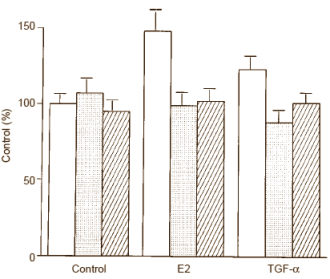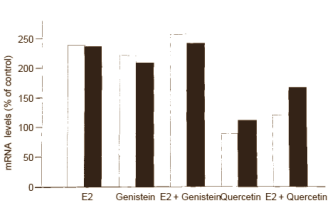|
Definition: "An ergogenic aid is any substance or phenomenon that enhances performance "
|
|
||||||||
18.08.2011 |
|
|
Test-tube study: quercetin undermines functioning of estradiol
Quercetin
There is plenty of circumstantial evidence for the anti-oestrogenic effect of quercetin. A Polish epidemiological study for instance has shown that women that drink large amounts of green tea have less estradiol in their bodies. [Br J Nutr. 2006 May;95(5):989-95.] In a Korean test-tube study ginkgo inhibited the effect of estradiol [J Steroid Biochem Mol Biol. 2006 Aug;100(4-5):167-76.] and in a similar American study the same effect was attributed to goji. Green tea, ginkgo and goji all contain quercetin – and lots of other substances too.
Quercetin as an anti-oestrogen
At a concentration of 1 micromole quercetin had no effect, but when the researchers exposed cancer cells to estradiol, quercetin inhibited their growth. [Shown by the bars with spots below]. Genistein had the same effect [The bars with the diagonal stripes].
When the Italians added 10 nanomoles estradiol and 5 micromoles genistein at the same time to the cells, these made more copies of the genes cathepsin D [black bars in the figure above] and pS2 [transparent bars] than when the cells were exposed to estradiol only. Cathepsin D and pS2 are controlled by the estradiol receptor. So in this case genistein enhanced the effect of estradiol.
Quercetin worked differently. At a concentration of 1 micromole, quercetin reduced the effect of estradiol on cathepsin D and pS2.
In other experiments the Italians were able to show that genistein is reasonably good at attaching itself to the estradiol receptor, but quercetin is not. The researchers suspect that quercetin in some way deforms the estradiol receptor. Estradiol is still capable of forming a complex with a deformed receptor, but the complex is rendered inactive.
Conclusion
Source:
More:
|
|




